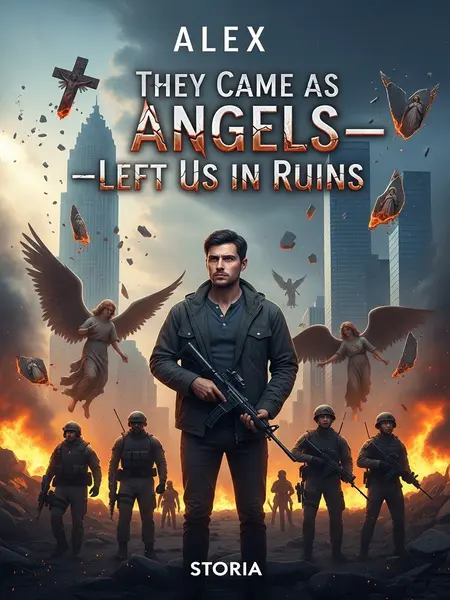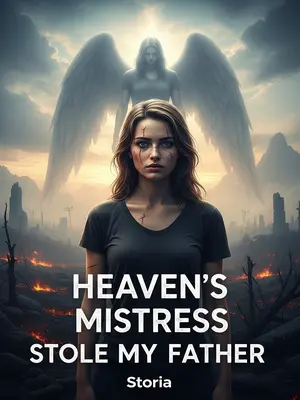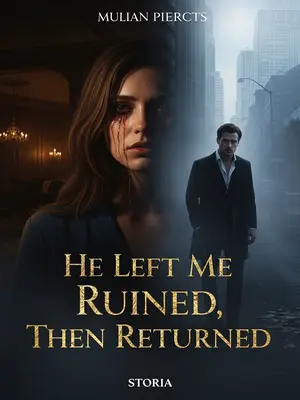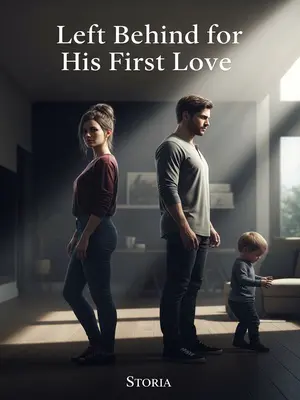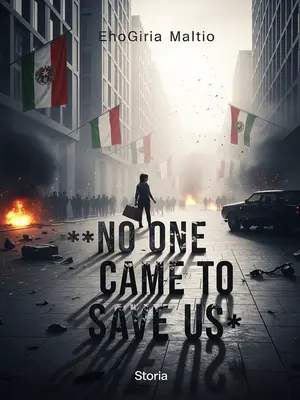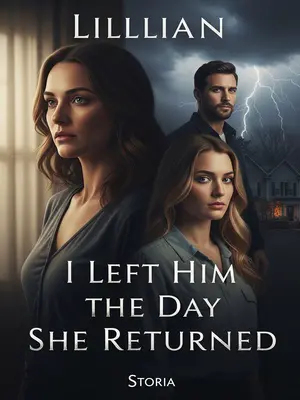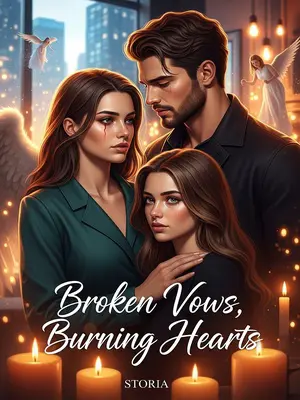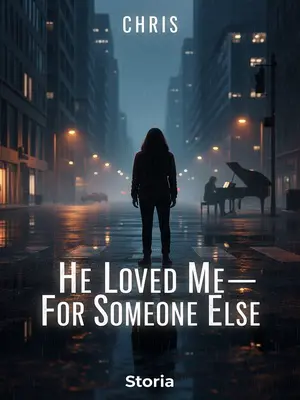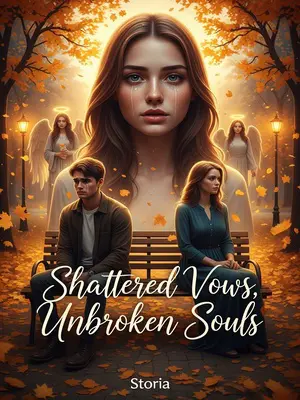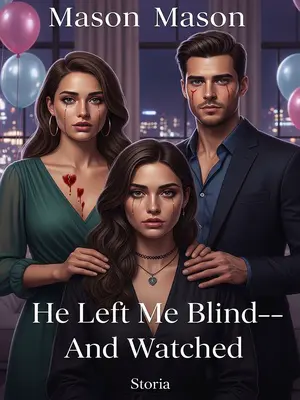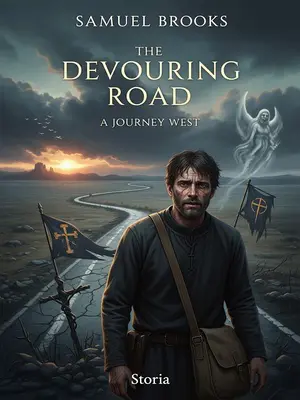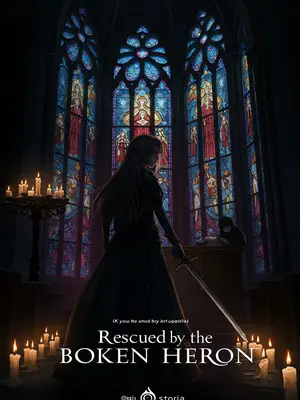Chapter 2: Flight Through a Broken World
The spear was gone, but it had wrecked my apartment. Furniture everywhere, the balcony gone, a ten-foot hole in the wall behind me, almost breaking through the whole building.
Dust stung my eyes. My lungs burned. The bookshelf was toppled, paperbacks scattered. The gaping hole let in cold night air, carrying the sound of sirens and distant gunfire.
If the cop hadn’t shot at the angel at the last second, making it miss, I’d be dead.
I shuddered, picturing the spear punching through my chest. I owed that cop my life—if he’d survived.
Clutching my arm, I staggered to the ruined balcony. Through the hole, the city was ablaze—fires, explosions, fighter jets streaking by, gunshots echoing nonstop.
The skyline looked like a war zone—orange flames licking at office towers, black smoke curling into the clouds. Helicopters buzzed between buildings, spotlights sweeping the streets. Somewhere, a car alarm wailed.
I called my parents, but nobody answered. They were in rural Ohio—I had no idea what was happening there.
My phone glowed with missed calls and unread messages, but every time I dialed, the call failed. I stared at the screen, willing it to connect. The silence on the other end felt like a punch to the gut.
Suddenly, stones rained down, cracks crawling through the walls—the building was about to collapse. No time to think. I stuffed whatever I could into my backpack and bolted down the stairs.
Dust and chunks of drywall rained from the ceiling. I grabbed my old hiking pack, jammed in water, snacks, my charger, and a battered first aid kit. The stairwell was pitch dark, emergency lights flickering. I ran, boots pounding, heart in my throat.
The neighbors were already gone. The stairwell was littered with dropped bags and junk.
A suitcase jammed in the doorway, clothes spilling out. A kid’s toy truck rolled underfoot. The building groaned, and I didn’t look back.
I stumbled out of the building. The street was packed with abandoned cars and—God—bodies. It looked like the set of a zombie movie, only nobody was getting back up.
The air reeked of gas and burnt rubber. Glass crunched under my boots. I skirted a body slumped against a mailbox, not daring to look too close. The world felt hollow, like someone had pressed pause on real life.
My phone buzzed with notifications. Angels had shown up everywhere, causing carnage. Luckily, the U.S. wasn’t as Christian as Europe, so there weren’t as many here. The National Guard was in full combat mode, closing in on the angels. Most areas were retaken, only some cities with tons of churches still fighting hard.
The push alerts scrolled by faster than I could read: "ANGELS SIGHTED IN CHICAGO—STAY INDOORS." "NATIONAL GUARD SECURES ATLANTA." "ST. PATRICK’S CATHEDRAL IN RUINS—NEW YORKERS FIGHT BACK." For once, America’s empty pews felt like a blessing.
But things were grim abroad. The angels’ goal was obvious: wipe us out. In those countries, it was rivers of blood, mountains of bodies. People hid in basements, subway tunnels, bomb shelters, praying for mercy that wasn’t coming.
I scrolled through photos from Paris, Rome, Warsaw—streets awash in red, churches burning, people huddled underground. I felt sick just looking at it. One video showed a mom clutching her kids in a subway tunnel, praying in three languages. The world map on the news was just red and black, every city a wound.
The United Nations put out an emergency call: "Doesn’t matter who you are—pick up a weapon and fight. For your family, your friends, your kids—don’t give up, no matter what. Stand together."
The message flashed everywhere: "Defend humanity. Do not surrender. Stand together." Even the President’s voice cracked from the White House bunker, urging Americans to hold the line. It sounded like an old war movie—patriotic, desperate, almost corny. But this time, it was real.
I didn’t care about speeches. I just wanted to find my family and get the hell out.
All I cared about was getting to Ohio, finding Mom and Dad, making sure they were safe. The rest of the world could burn for all I cared right then.
Traffic was a nightmare—cars blocking every road. I picked a direction and, under cover of night, headed where the survivors were evacuating.
I slung my backpack over one shoulder, slipped between the cars, keeping my head down, heart pounding. The city’s streetlights flickered, half of them dead. Sirens wailed in the distance, and the air stank of fear and burnt oil.
I climbed over car hoods, ducking as angels flew overhead. Their night vision seemed lousy; I lay flat and avoided them easily.
Once, I ducked behind a minivan as an angel swept past, wings stirring up trash and dust. I pressed my cheek to the cold metal, holding my breath. When it was gone, I crawled forward, heart hammering.
After half an hour, I hadn’t seen a single other person. The gunfire and explosions were far off—maybe everyone had already gotten out. Maybe I was the last one left.
The silence was unreal—no voices, no footsteps, just the distant rumble of chaos. I almost laughed, thinking, Maybe I missed the last bus out of town.
Then my phone rang. It was my parents. For a second, I forgot how to breathe.
I fumbled for the phone, hands shaking, and answered on the second ring, voice cracking with relief: "Mom? Dad? Are you okay?"
They’d seen the news, called a million times, sent texts. For some reason, none had come through until now.
The call lagged, their voices thin and far away. Mom was frantic, Dad tried to sound calm. They said the landline worked better. I apologized, promised I was safe.
They were out in the country, untouched. Hearing their voices finally let me breathe. They asked about me. I lied and said I was in a shelter—I didn’t want them to worry. Before I could finish, a crash boomed nearby.
My relief vanished. I told them I loved them, promised to call soon, then hung up as the crash echoed down the street. My hands shook as I shoved the phone in my pocket.
An angel dropped from the sky, landing hard on a car. Someone inside screamed, trying to escape, but the car had crumpled, trapping them.
The angel’s wings snapped open, glass flying everywhere. The car’s roof folded like a soda can. The person inside pounded on the window, screams muffled by twisted metal.
I hung up fast and crawled under a nearby car, barely daring to breathe.
The pavement was cold, gritty. I pressed myself flat, heart pounding so hard I thought the angel would hear it. I held my breath, wishing I could disappear.
The angel gripped its sword, sliced open the car roof like it was tin foil, grabbed the person by the neck, and lifted him out, chanting in some guttural, twisted language.
The sound was mechanical, alien, the words crawling up my spine. The angel’s grip was casual, chilling in its indifference, as it hoisted the man into the air.
Then it slowly stabbed the sword into the man’s body, slicing downward until he was cut in two.
Blood sprayed across the street, painting the car and the angel’s robe. The man’s screams turned to a gurgle. I squeezed my eyes shut, trying not to puke.
The man’s struggles faded, then stopped.
The silence after was worse than the noise. The angel dropped the body halves, wings folding behind its back.
The angel tossed the corpse aside, then pressed its hands together in prayer.
It bowed its head, lips moving in that twisted language, like the murder was some kind of holy act. The streetlights flickered, shadows stretching.
Suddenly, a rocket exploded against the angel’s back, slamming it into a wall. Before it could move, gunfire erupted, then another rocket hit, flames swallowing the angel.
The blast rattled the car above me. I peeked out—saw the angel smashed into a wall, wings on fire. Bullets tore through the air, another explosion. The angel screeched, the sound raw and inhuman.
Several fully armed soldiers rushed out. One carried a flamethrower, dousing the angel in fire. The angel shrieked, then finally fell silent, its body charred.
The soldiers didn’t say a word—just moved like they’d done this a hundred times. The one with the flamethrower kept spraying until the angel stopped moving. The others covered him, guns locked on the corpse.
Good. These soldiers weren’t playing hero—they ambushed the angel, and this time it didn’t get away. Otherwise, they wouldn’t have stood a chance.
I let out a shaky breath, grateful for their ruthlessness. These weren’t movie heroes—they were survivors, and they knew what it took.
Seeing our troops, I jumped out, waving and running toward them.
I scrambled out from under the car, hands raised, yelling, "Hey! Over here!" My voice sounded thin and desperate, but I didn’t care. I needed help.
The soldiers barely blinked—just motioned for me to hurry. I jogged up, but before I could speak, one suddenly clamped a gloved hand over my mouth and pulled me into a supermarket.
I almost bit him, but then I heard the screams. He dragged me behind shopping carts, crouching low. The others huddled beside us, weapons ready.
A few minutes later, more angels dropped from the sky. Seeing their dead comrade, they let out a piercing, furious shriek. The sound vibrated in my skull, so sharp it made my eyes water. The soldiers clamped hands over their ears, teeth gritted. I nearly lost it from the noise. Luckily, the angels soon stopped, picked up the body, and flew away.
The silence afterward was almost worse. One soldier, hit by falling bricks, held back his cries until the angels left, then gasped in pain. The others quickly helped him.
They cut away his sleeve, wrapping his arm in gauze with quick, practiced hands. The wounded man bit his lip, but didn’t make a sound. I helped steady him, grateful for something to do.
I must’ve zoned out. I sat on the ground a long time before I realized someone was talking to me.
"Hey, buddy, you all right? Can you hear me?"
A soldier knelt in front of me, worry etched into his face. He looked like he hadn’t slept in days.
"Yeah, I can hear you!"
My voice came out hoarse, but his relief was obvious.
"Can you still walk? We’ll get you to the safe zone!"
I nodded fast. Having soldiers with me was way safer than being alone.
I scrambled to my feet, backpack clutched tight. The soldiers moved out in a tight group, eyes scanning the sky.
As we moved, the soldiers filled me in on the situation.
We ducked through alleys and side streets. One soldier—older, Missouri accent—gave me the rundown in short, clipped bursts, like he was reading a casualty report.
All over the world, these angelic monsters had attacked. Catholic countries in Europe and the Americas got hit hardest. Armies could only hold out in fortresses and strongholds; civilian casualties were off the charts.
He told me Paris was a war zone, Rome in ruins, Mexico City gone dark. The Vatican was just a crater. In some places, only a few survivors were holed up in Cold War bunkers or subway tunnels.
The Vatican had been flattened, church hierarchy almost wiped out in the first wave. Surviving archbishops tried to elect a new Pope by video, but many gave up and committed suicide after their faith was shattered.
He paused, voice heavy. "Heard a lotta bishops just gave up. Couldn’t take it. Some tried to keep the faith, but most…well, you can imagine."
Big Ben in London collapsed, and the British King’s plane crashed at 3:12 p.m. Prince Edward announced his succession, holding his coronation in a bunker, vowing to lead the Brits to victory. Londoners hid in air-raid shelters—the same ones that protected them from Nazi bombs seventy years ago.
The soldier snorted, half amused. "History repeats. Brits back in their bomb shelters, King Edward on the radio. Like the Blitz, only with monsters instead of Messerschmitts."
The French president gave a televised address, suggesting surrender. The public protested, unanimous. The opposition called for people to vote for themselves to lead the fight. The Louvre, Notre-Dame, Versailles all caught fire. The Eiffel Tower was destroyed, and the angels forged a huge iron cross, nailing living people to it.
He shook his head. "French president tried to give up. Folks weren’t having it. Now the angels are making a show of it—turning Paris into a graveyard."
The U.S. president, holed up in a safe house, ordered all U.S. military bases home, putting national security first. The U.S. was hit hardest—New York, LA, San Francisco, Boston, Chicago, DC, Seattle—everywhere was chaos. Tens of millions of angels destroyed city after city, flattening every church, ignoring all pleas, killing without mercy.
